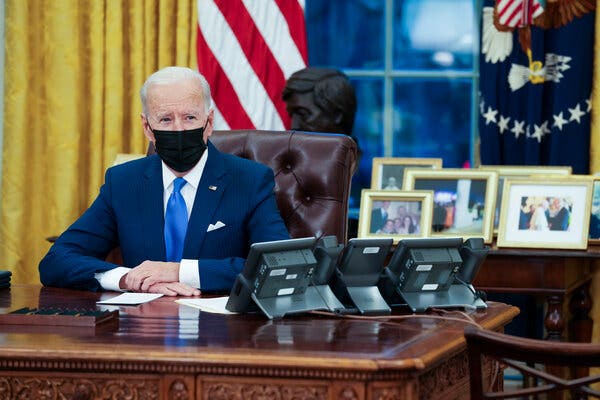At the close of President Biden’s first month in office, the administration that hit the ground running is now working to maintain momentum amid a maelstrom of overlapping emergencies: a global pandemic, a jobs crisis, a stumbling vaccine rollout, and a series of deadly winter storms.
Mr. Biden’s term began with a burst of executive action. He signed 17 orders, proclamations and memorandums on Inauguration Day, rejoining the Paris Climate Agreement, canceling the Keystone XL pipeline and ending his predecessor’s travel ban on some predominantly Muslim and African countries.
But some of his first 30 days were spent in the shadow of Donald J. Trump’s impeachment trial — a subject Mr. Biden largely avoided.
In the week since Mr. Trump’s acquittal on Saturday, Mr. Biden has been busy. On Tuesday, he left Washington on official business for the first time as president, for a CNN town hall in Milwaukee. He offered to restart talks with Iran on Thursday, a major step toward restoring the Iran nuclear deal that the Trump administration abandoned. And on Friday, he is scheduled to appear in his first major international event with a virtual address at the annual Munich Security Conference, and then fly to Kalamazoo, Mich., to tour a Pfizer coronavirus vaccine production site — all against the backdrop of frigid storms that have overwhelmed power grids and blanketed nearly three-quarters of the continental United States in snow.
None of this has been untouched by the pandemic, which has sickened more than 100 million people around the world, taken 2.4 million lives, disrupted personal livelihoods and cratered national economies. The United States is nearing half a million deaths from Covid-19.
The administration’s $1.9 trillion coronavirus relief plan has been the top priority for Mr. Biden, who sees himself as an accomplished dealmaker. The real effort in Congress will begin in earnest next week as the House moves to pass the stimulus package.
Using a strict parliamentary process known as reconciliation, which allows the majority party to bypass the Senate filibuster, House Democrats are expected to finalize Mr. Biden’s proposal in the coming days. Speaking at her weekly news conference on Thursday, Speaker Nancy Pelosi of California said the legislation would be ready “for us to vote on sometime at the end of next week, is my hope.”
But it remains unclear which item on Mr. Biden’s agenda takes second billing after coronavirus relief. In recent days, administration officials have rolled out a proposed overhaul of the nation’s immigration laws and sought advice from labor leaders on an infrastructure plan. Members of Mr. Biden’s team have been discussing what the next phase of his agenda will look like and how it will be rolled out, according to two top White House advisers.
Emily Cochrane contributed reporting.

As a senator and as vice president, Joe Biden was one of the few people in Washington who actually enjoyed summit meetings — and was eager to show up at the Munich Security Conference, the meeting of Europe’s diplomatic and defense elites.
Two years ago he even showed up in Munich as a private citizen — one who was already running for president — backslapping his way through the jammed Hotel Bayerischer Hof, where the event is always held, and assuring allies that the Trump era would end, some day.
On his return on Friday, there will be no glad-handing as the event is being held virtually and Mr. Biden will be speaking by video link. But his message will be clear, according to aides. The Trump era of “America first” diplomacy is over.
For all the violence and tumult in Washington in recent months, he plans to say, autocracies will never outperform democracies, and restored alliances are the West’s pathway to restored influence. He will chastise China and warn Europe about the need to push back hard on Vladimir V. Putin’s Russia.
For the Europeans, dealing with Mr. Biden will be like putting on a pair of well-worn shoes — they know just what it will feel like. But Mr. Biden, some aides acknowledge, will also face more than a few doubters, who wonder whether his presidency will be just a brief alliance-friendly interregnum, and that the era of America First has not been extinguished.
His speech to the Munich security forum is expected to be broad in scope, those who have seen it say, arguing that the United States and its European allies can take on China without descending into a Cold War, and that the only way to deal with Russia is to push back hard against Mr. Putin.
He will list the treaties and multinational institutions that the United States has re-entered or re-engaged with in recent weeks, from the Paris agreement on climate change to the World Health Organization to Covax, the public-private effort to distribute vaccines around the world equitably.
And on Thursday night, just before the speech, the State Department issued its first road map for re-entering talks with Iran for the first time in four years. It marks the first time since early 2018 that Europe and the United States were on the same page on an Iran strategy.
In public this will all generate applause; European leaders are just happy, they say, to go to a meeting without fear that the United States will be hinting it is getting ready to depart from the NATO alliance.
But Europeans, Mr. Biden’s aides concede, do not have the same view of China and the threat posed by its economic dominance and political influence. And the dependence of European countries on Russian energy supplies limits their enthusiasm for joining Mr. Biden in declaring that Mr. Putin will pay a price for undermining democracies.

The United States took a major step on Thursday toward restoring the Iran nuclear deal that the Trump administration abandoned, offering to join European nations in what would be the first substantial diplomacy with Tehran in more than four years, Biden administration officials said.
In a series of moves intended to make good on one of President Biden’s most significant campaign promises, the administration backed away from a Trump administration effort to restore United Nations sanctions on Iran. That effort had divided Washington from its European allies.
And at the same time, Secretary of State Antony J. Blinken told European foreign ministers in a call on Thursday morning that the United States would join them in seeking to restore the 2015 nuclear accord with Iran, which he said “was a key achievement of multilateral diplomacy.”
Hours later, Enrique Mora, the European Union’s deputy secretary general for political affairs, appealed to the original signers of the nuclear deal to salvage it from “a critical moment.”
“Intense talks with all participants and the US,” Mr. Mora said on Twitter. “I am ready to invite them to an informal meeting to discuss the way forward.”
Mr. Biden has said he would lift sanctions imposed by President Donald J. Trump only if Iran returns to the limits on nuclear production that it observed until 2019.
The announcement will open what is likely to be a delicate set of diplomatic offerings. A State Department official said the United States had no indication whether Iran will accept the offer, and cautioned that the prospect of a meeting was a first step in what would be a lengthy, difficult process toward restoring the nuclear deal.
The State Department said that Iran must return to full compliance with the deal — as the Biden administration has insisted — before the United States would unwind a number of American economic sanctions that Mr. Trump imposed against Tehran, crippling the Iranian economy.
Until then, and as a good-will gesture, the Biden administration withdrew a demand from last fall that the United Nations Security Council enforce international sanctions against Iran for violating the original 2015 agreement that limited its nuclear program.
Nearly every other nation had rejected the Trump administration’s insistence that the United States could invoke the so-called snap back sanctions because it was no longer a part of the accord.
Additionally, the Biden administration is lifting travel restrictions on Iranian officials who seek to enter the United States to attend U.N. meetings, said the official, who spoke on the condition of anonymity before the actions were announced.
The Iranian foreign minister, Mohammad Javad Zarif, said on Twitter that Tehran was waiting for American and European officials to “demand an end to Trump’s legacy of #EconomicTerrorism against Iran.”
“We’ll follow ACTION w/ action,” Mr. Zarif tweeted.

Politicians from both parties wanted to identify a villain for the mania that surrounded the trading in GameStop stock last month that roiled the markets, alarmed Wall Street and made winners and losers of many small investors. On Thursday, they took aim at Vlad Tenev, the chief executive of Robinhood, the free trading app that fueled much of the buying and selling.
“You are at the center of this,” Representative David Scott, a Democrat from Georgia, told Mr. Tenev, who received more than half of all the questions asked at a congressional hearing conducted via videoconference. “Don’t you see and agree that something very wrong happened here? And that you are at the center of it?”
Members of the House Financial Services Committee called the hearing to try to make sense of why the stock of GameStop — a troubled video game retailer that was once a mainstay of suburban malls — had attracted so many small investors in late January. They also wanted to know whether Wall Street players that were involved in the trading benefited at the expense of those small investors, and whether the events highlighted shortcomings of market structure or regulation.
But mostly, they wanted to know if Robinhood, a Silicon Valley start-up that rode to success on the strength of its message to democratize finance, was actually encouraging customers to take unnecessary risks and making money at their expense.
Most of the panelists were major players during a two-week period last month, when millions of small investors egged on one another via Reddit and other online forums to buy GameStop, driving the stock to stratospheric levels. Those small investors were at least partly motivated by a desire to hurt big Wall Street firms, like Melvin Capital, which had bet that GameStop’s shares would fall.
Several lawmakers pointed out how, after Robinhood curtailed trading in GameStop and a dozen other stocks last month, it was slow to explain why it had done so. That gave rise to several conspiracy theories that Robinhood was making decisions at the bidding of hedge funds like Melvin Capital and Citadel.
Mr. Tenev categorically denied that was the case. “We don’t answer to hedge funds,” he said. “We serve the millions of small investors who use our platform every day to invest.”
But Mr. Tenev’s response did not satisfy several of the members of Congress.
“There is an innate tension in your business model, between democratizing finance, which is a noble calling, and being a conduit to feed fish to sharks,” Representative Sean Casten, a Democrat from Illinois, said.

As the Manhattan district attorney’s office steps up the criminal investigation of Donald J. Trump, it has reached outside its ranks to enlist a prominent former federal prosecutor to help scrutinize financial dealings at the former president’s company, according to several people with knowledge of the matter.
The former prosecutor, Mark F. Pomerantz, has deep experience investigating and defending white-collar and organized crime cases, bolstering the team under District Attorney Cyrus R. Vance Jr. that is examining Mr. Trump and his family business, the Trump Organization.
The investigation by Mr. Vance, a Democrat, is focused on possible tax and bank-related fraud, including whether the Trump Organization misled its lenders or local tax authorities about the value of his properties to obtain loans and tax benefits, the people with knowledge of the matter said, requesting anonymity because of the sensitive nature of the investigation.
Mr. Trump has maintained he did nothing improper and has long railed against the inquiry, calling it a politically motivated “witch hunt.”
In recent months, Mr. Vance’s office has broadened the long-running investigation to include an array of financial transactions and Trump properties, as prosecutors await a ruling from the United States Supreme Court that could give them access to Mr. Trump’s tax returns.
Prosecutors have said the tax returns and other financial records are vital to their inquiry — and the Supreme Court has delayed a final decision for months.
Manhattan prosecutors have also subpoenaed the Trump Organization for records related to tax deductions on millions of dollars in consulting fees, some of which appear to have gone to the former president’s daughter Ivanka Trump.
The Trump Organization turned over some of those records last month, though the prosecutors have questioned whether the company has fully responded to the subpoena, the people with knowledge of the matter said.
The Trump Organization declined to comment, but in the past, lawyers for the company have said that its practices complied with the law and have called the investigation a “fishing expedition.”
Mr. Pomerantz, 69, was sworn in earlier this month to serve as a special assistant district attorney, according to Danny Frost, a spokesman for the district attorney, who otherwise declined to comment on the inquiry. Mr. Pomerantz will work solely on the Trump investigation.
Mr. Pomerantz was a federal prosecutor in the United States attorney’s office in Manhattan, where he rose to lead the appellate unit before leaving in 1982. In private practice, he developed a specialty in organized crime and was involved in a 1988 case that helped determine the legal definition of racketeering.
Mr. Pomerantz returned to the Manhattan U.S. attorney’s office to head the criminal division between 1997 and 1999, overseeing major securities fraud and organized crime cases, perhaps most prominently against John A. Gotti, the Gambino boss.
The hiring of an outsider is a highly unusual move for a prosecutor’s office, but the two-and-a-half-year investigation of the former president and his family business is unusually complex.



















